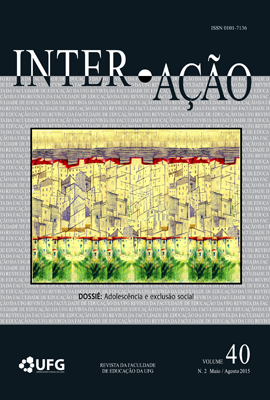EDUCAÇÃO DE ADOLESCENTES PRIVADOS DE LIBERDADE: UMA ABORDAGEM VIGOTSKIANA
DOI:
https://doi.org/10.5216/ia.v40i2.32818Keywords:
Palavras Chave, adolescente, medida socioeducativa, educação, e ensino.Abstract
Os adolescentes que cumprem medida socioeducativa de internação tem um histórico de pouquíssima frequência escolar, antes durante e depois da internação. Utilizando a psicologia Histórico-Cultural de L. S. Vigotski, o artigo fundamenta uma concepção de que o psiquismo é histórico e não inato ou um ideal do espírito, pressupondo uma maior valorização de conteúdos científicos na educação escolar desses adolescentes. Na terceira parte fundamenta uma crítica á prática pedagógica que valoriza excessivamente o lúdico e que entende a autoridade e a disciplina como procedimentos pedagógicos autoritários e ineficazes. Conclui que a concentração e a disciplina para apropriação de conhecimentos ditos clássicos são fundamentais para o desenvolvimento dos adolescentes privados de liberdade.
Downloads
Downloads
Published
How to Cite
Issue
Section
License
Inter-Ação uses the Creative Commons Attribution 4.0 License for Open Access Journals (Open Archives Initiative - OAI) as the basis for the transfer of rights. Open access means making documents available on the Internet free of charge, so that users can read, download, copy, distribute, print, search, or link to the full text of documents, process them for indexing, use them as input data for software programs, or use them for any other lawful purpose, without financial, legal, or technical barriers.
Authors publishing in this journal agree to the following conditions:
1) Authors retain copyright and grant the journal the right of first publication, with the work simultaneously licensed under the Creative Commons Attribution License, which permits redistribution of the work with attribution and first publication in this journal.
2) Authors are permitted to enter into additional, separate agreements for non-exclusive distribution of the version of the work published in this journal (e.g., for publication in an institutional repository or as a book chapter), with attribution and first publication in this journal.
3) Authors are permitted and encouraged to publish and distribute their work online (e.g. in institutional repositories or on their home page) at any time before or during the editorial process, as this may generate productive changes as well as increase the impact and citation of the published work.















